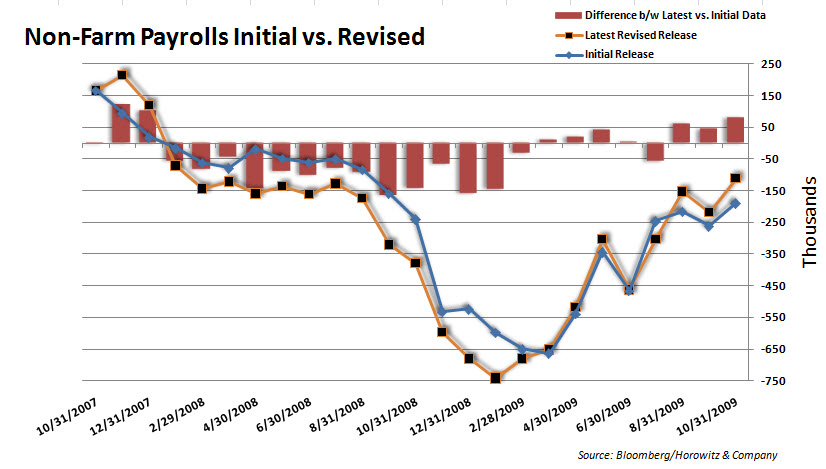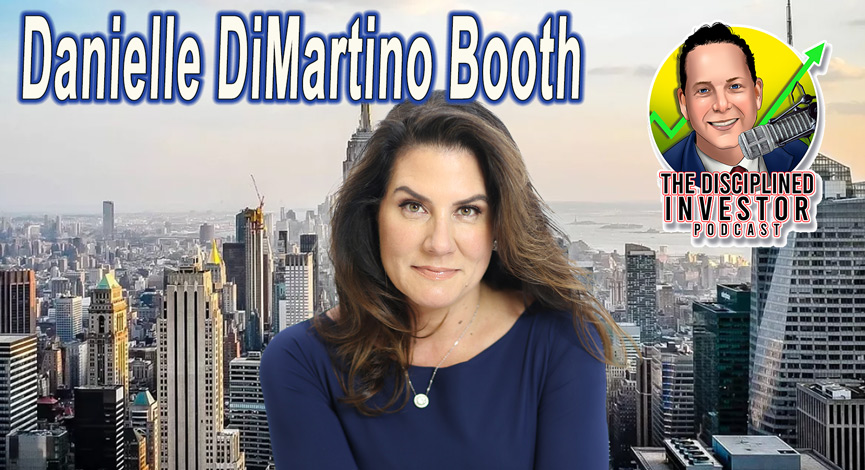When we first learned about Dubai’s debt woes a couple of weeks ago, it was estimated that $46 billion plus was in danger of default. The world markets sold off hard as there was concern that this level of sovereign default could not be absorbed by the system. Soon after, fears were allayed as it was announced that it was really only $26 billion in question. Whew, that was close!
Of course that was a gorgeous play by the PR spinsters – a play which has been mastered over the last couple of years. This is one of the two basic strategies that have been used to help corral the psychology of the (investing and consumer) herd.
First, is what we call the carrot-syndrome. Hold something out in the near distance and let us believe that there is hope and we will race toward it with fervor. Simple phrases like green-shoots, less-bad and continued-stabilization; along with economic reports that are later revised downward, help to instill confidence. A great example of this may be the massive revisions to the BLS payroll numbers during the past year.
The chart below show just how many jobs were actually lost versus initially reported. It also provides the adjusted numbers which were later revised higher with the difference highlighted by the red bars. The question to ask: Was this intentional, meant to soften the bad news or just bad research?
(Click on chart to enlarge)
Then there is the masterful process of news leaks and market tests. For example, many times we have read and heard about news items from “un-named sources, close to the matter,” providing just a touch of news. Depending on how the markets react, that news is usually “tweaked” or retracted entirely. This hit its height during the bank stress tests earlier this year. Somehow, the banks that passed were slowly leaked out, testing investor reaction.
The Dubai announcement last week now appears to be a similar PR campaign by obfuscation . The information about a $56 billion default created panic. Then, the numbers were adjusted downward by 50% so that it was more palatable. We are now hearing that it is actually closer to the original number.
Dec. 8 (Bloomberg) — Debt restructuring by Dubai state-run companies may almost double to $46.7 billion as more of the emirate‘s businesses could need help making payments, Morgan Stanley said.
Allowing the information to sink in for a few days helps to desensitize us to the enormity of the problem. And now, a $25, $30 or $50 billion default is not manageable, contrary to what so many banks have stated. Remember, this is the tip of an iceberg – today it is Dubai, but we still have Greece and Latvia to consider.
In the future, keep a close eye on the news and look out for both these PR tactics. The problems do not disappear by just wising them away or creating the illusion that it is manageable. Truth be told, even David Copperfield would have trouble with Dubai’s debt problems.
WSJ – An added complexity is that bondholders will be in competition with the more than 80 bank creditors of Dubai World.
The banks on Wednesday began formulating a plan for negotiating a restructuring of the conglomerate’s debt to lenders and bond holders. KPMG LLP is expected to be appointed this week to advise the interests of the lenders, said people familiar with the situation.
All creditors must agree to the standstill in order for it to be valid, according to restructuring professionals from two law firms who have seen Dubai World’s sukuk documentation.
If the standstill isn’t agreed to by Dec. 14, when Nakheel’s sukuk is due, Dubai World will technically be in default. If Nakheel defaults, it will be the largest-ever sukuk default in the world and the first sukuk default in the United Arab Emirates.
The latest tidbit shed a little more light on the severity of the problem. It also gives further clarification as to the position that Dubai (the government) is taking with respect to the debt.
Note: The government has made a clear distinction between “backing” and guaranteeing of the debt.
DUBAI (Reuters) – Six months is not enough time to restructure indebted state-controlled conglomerate Dubai World, the emirate’s finance chief said on Tuesday, adding that it had enough assets to meet its obligations….
…”The government is present to provide backing as an owner … we would like to emphasize the distinction between guaranteeing and backing. The company receives large backing from the government since its inception,” Saleh said.
What will the next little gem be, we wonder?
____
Disclosure: Horowitz & Company clients may hold positions of securities mentioned as of the date published.

















